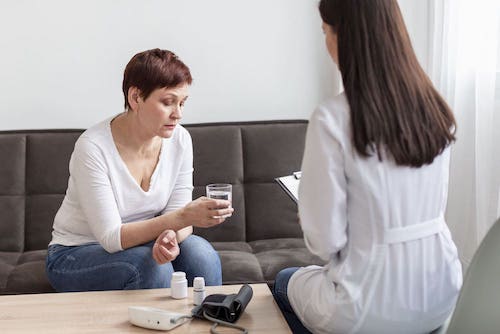If you are participating in group therapy as a facilitator, leader, or client, it’s important to have discussion questions for group therapy and good group therapy discussion topics that are thoughtfully crafted and diverse to foster deeper insights, emotional exploration, and healing within a supportive and inclusive therapeutic environment.

The importance and value of group therapy
Group therapy is a supportive and inclusive therapeutic environment that offers unique opportunities to apply skills you may have acquired through individual therapy, learn from others, and share in such a way that you can gain deep insight and explore your emotions without fear of judgment or exclusivity.
For many people, group therapy is also a way to avoid the isolation they might experience after reaching out for professional mental health or substance abuse treatment. During sessions, these gains can only be made when participants have well-thought-out group therapy topics for discussion, topics that can drive essential, therapeutic insight beneficial to all participants.
The best group therapy discussion topics
Preparing the right questions for group therapy discussion sessions can drive group cohesion, bringing people together because they can acknowledge that what they feel, experience, or think is similar to others. Group therapy discussion questions can help foster trust and openness among other members, facilitating an open and honest discussion that might otherwise not occur.
Identity and Self-Concept
Picking good discussion topics should start with identity and self-concept.
– Exploring who we are and how we perceive ourselves.
People need to explore their identity and who they are. Someone who has struggled with bipolar disorder might not know how to identify themselves and whether their self-concept is centered around manic episodes or depressive episodes, having bipolar disorder, or something else entirely.
An open discussion can help individuals recognize that they are more than just a mental health disorder, a chronic pain diagnosis, or a trauma in their past.

– How does our identity impact our emotions and behavior?
From there, building on how identity impacts emotions and behaviors is important. The way in which an individual develops their self-concept and identity will greatly impact how they behave. If someone’s identity is tied directly to their religion, there can be many ways in which a mental health disorder, family experience, past trauma, or history of substance abuse can severely impact negative emotions and possibly harmful behavior.
Opening up a discussion of these relationships can help facilitate a greater understanding and, in some cases, a more realistic or positive view of self.
Relationship Dynamics
Questions for group therapy discussion should involve relationship dynamics. No mental health disorder or substance abuse issue will affect an individual in isolation.
– Understanding our patterns in relationships.
People need to recognize what patterns they have in their relationships. Without any room for guided and deep self-reflection, individuals are more likely to continually believe that everyone around them might display the same behaviors or have the same problems, failing to recognize their impact on relationship patterns as well.
– Discussing healthy versus unhealthy relationship dynamics.
This can lead to a discussion about healthy versus unhealthy relationship dynamics. Understanding which dynamics are healthy and unhealthy can provide crucial information for people looking to move forward, build new friendships, set healthy boundaries with their family, or even find support in a loved one.
Coping Mechanisms and Resilience
Questions for a group therapy discussion can be asked about coping mechanisms and resilience, especially if individuals need to know what strategies other people have employed and to what success.
– Delving into how we cope during stressful times.
Group therapy is where people learn coping mechanisms and build their resilience. Life will not be without stress, and people can only control how they respond to that stress.
– Strategies for building resilience and mental strength.
Opening up a discussion of how people use coping mechanisms can help other members learn new coping strategies, review what strategies might have worked in the past but need to be modified, and contribute strategies themselves.

Past Experiences and Traumas
Group therapy discussion topics can touch on past experiences and trauma. Traumatic experiences might need to be dealt with carefully, especially if they could serve as a trigger for other members, but it’s still important to talk about.
– Reflecting on how past events shape our current selves.
Opening up the discussion to a reflection on the way in which past events shape current selves can help people recognize factors that may have contributed to where they are. An individual in a group therapy session might be asked why they slouch by another participant only to recognize that in childhood, their father, who was a blue-collar worker, regularly criticized people who stood upright and tall as arrogant and erudite.
– Sharing strategies for processing and healing from traumas.
In a group therapy session thereafter, that same individual might, with new knowledge of how past events had shaped simple things like how they stand, learn strategies for processing that information. That same individual might suffer from chronic back pain all because they have spent their adult life slouching for fear of being ridiculed as arrogant. But with open group therapy discussions, they’ll have the tools to overcome.
Life Transitions and Change
Good discussion questions for group therapy can touch on life transitions and change. Any change in life can bring about stress, and stress can bring about a higher risk of symptoms or triggers.
– Embracing life’s inevitable changes and transitions.
While looking into the past is essential in group therapy, so is looking toward the future. Discussion should move toward embracing the changes and transitions that will invariably lie ahead and the ways in which people have done that, hope to do that, or will do that.
– Dealing with feelings of loss, excitement, or apprehension during significant life changes.
Open discussions can provide places where emotions like feelings of loss, apprehension, and excitement can all be discussed in a trusting and safe environment. Learning that others have experienced similar life transitions or the same emotions regarding significant life changes can make a meaningful impact.

Are there any benefits of engaging in deep discussions in group therapy?
Absolutely. Without good group therapy topics for discussion, sessions can go by with conversation staying at a surface level and never diving deeply into legitimate concerns that people have or past traumas that might have contributed to their current states of being. Failure to review important relationship dynamics or life transitions can leave people feeling as though they might be the only ones experiencing certain things or dealing with unresolved trauma.
Summing Up
Having well-structured group therapy discussion topics helps promote deeper insights and emotional growth. You can always adjust your questions to fit each group’s unique dynamic and needs by changing the discussion questions for group therapy to accommodate gender if it is a gender-based class or to accommodate symptoms of a specific mental health disorder if the group therapy is for individual conditions.
If the group therapy session is designed for families or individuals who are supporting a loved one with a specific condition, the group therapy discussion questions can be catered to the impact actions or behaviors of a loved one are having rather than the impact mental health condition or disease is having.



